|
|
|
Sort Order |
|
|
|
Items / Page
|
|
|
|
|
|
|
| Srl | Item |
| 1 |
ID:
091030
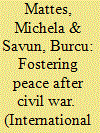

|
|
|
|
|
| Publication |
2009.
|
| Summary/Abstract |
Lasting peace after civil war is difficult to establish. One promising way to ensure durable peace is by carefully designing civil war settlements. We use a single theoretical model to integrate existing work on civil war agreement design and to identify additional agreement provisions that should be particularly successful at bringing about enduring peace. We make use of the bargaining model of war which points to commitment problems as a central explanation for civil war. We argue that two types of provisions should mitigate commitment problems: fear-reducing and cost-increasing provisions. Fear-reducing provisions such as third-party guarantees and power-sharing alleviate the belligerents' concerns about opportunism by the other side. Provisions such as the separation of forces make the resumption of hostilities undesirable by increasing the costs of further fighting. Using newly expanded data on civil war agreements between 1945 and 2005, we demonstrate that cost-increasing provisions indeed reduce the chance of civil war recurrence. We also identify political power-sharing as the most promising fear-reducing provision.
|
|
|
|
|
|
|
|
|
|
|
|
|
|
|
|
| 2 |
ID:
091029
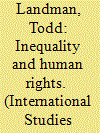

|
|
|
|
|
| Publication |
2009.
|
| Summary/Abstract |
This article tests the empirical relationship between inequality and the protection of personal integrity rights using a cross-national time-series data set for 162 countries for the years 1980-2004. The data comprise measures of land inequality, income inequality, and a combined factor score for personal integrity rights protection, while the analysis controls for additional sets of explanatory variables related to development, political regimes, ethnic composition, and domestic conflict. The analysis shows robust support for the empirical relationship between income inequality and personal integrity rights abuse across the whole sample of countries as well as for distinct subsets, including non-communist countries and non-OECD countries. The hypothesized effect of land inequality is also born out by the data, although its effects are less substantial and less robust across different methods of estimation. Additional variables with explanatory weight include the level of income, democracy, ethnic fragmentation, domestic conflict, and population size. Sensitivity analysis suggests that the results are not due to reverse causation, misspecification or omitted variable bias. The analysis is discussed in the context of inequality and rights abuse in specific country cases and the policy implications of the results are considered in the conclusion.
|
|
|
|
|
|
|
|
|
|
|
|
|
|
|
|
| 3 |
ID:
091026


|
|
|
|
|
| Publication |
2009.
|
| Summary/Abstract |
Decisions within the Clean Development Mechanism (CDM) of the Kyoto Protocol are made by an expert body that acts as a trustee agent of the member states. Trustee agents help overcome the credible commitment problems of their principals and promise reason-based decisions. In contrast to traditional principal-agent settings, trusteeship relations are typically triadic. Beside the preferences of the principals and the trustee, decision criteria provide an external point of reference. They reflect the principals' long-term interest and define the trustee's decision rationale. The triadic structure helps protect the autonomy of trustees and allows for making them accountable for their decisions. Accountability mechanisms intend to ensure that a trustee's decisions are in line with established decision criteria. Against this backdrop, we explore the incentives created by the existing institutional arrangement for the making of CDM decisions and examine selected cases. We conclude that CDM arrangements provide a model for nonpartisan international regulation.
|
|
|
|
|
|
|
|
|
|
|
|
|
|
|
|
| 4 |
ID:
091018


|
|
|
|
|
| Publication |
2009.
|
| Summary/Abstract |
Providing an overview of the emergence, characteristics, trajectory, and potential limitations of the transnational anti-base network, this article focuses on two broad questions relevant to transnational politics. First, what processes and mechanisms enabled local and transnational activists to form the international No Bases network? Second, how did activists juxtapose existing local anti-base identity and frames to emerging transnational ones? Following existing transnational movement theories, I argue that the global anti-base network slowly emerged through processes of diffusion and scale shift in its early stages. The onset of the Iraq War, however, injected new life into the transnational anti-base movement, eventually leading to the inaugural International Conference for the Abolition of Foreign Bases in 2007. Although loose transnational ties existed among anti-base activists prior to 2003, the U.S. war in Iraq presented anti-base activists the global frames necessary to accelerate the pace of diffusion, scale-shift, and brokerage, and hence, the consolidation of a transnational anti-base network. Paradoxically, however, even as No Bases leaders attempted to forge a new transnational identity, anti-base activists, as "rooted cosmopolitans," continued to anchor their struggle in local initiatives.
|
|
|
|
|
|
|
|
|
|
|
|
|
|
|
|
| 5 |
ID:
091034
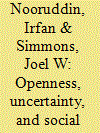

|
|
|
|
|
| Publication |
2009.
|
| Summary/Abstract |
We extend the literature on openness and spending in developing countries arguing that the effect of increasing openness depends on both regime type and the level of openness. Democracies respond to increases in openness by increasing spending while dictatorships respond by decreasing spending. However, the degree to which countries pursue the strategy of choice depends on the level of openness. In autarkic countries, an increase in import competition has more severe consequences for perceptions of job insecurity and dislocation. In response, government management of openness will be more vigorous under these conditions regardless of whether the leader increases or decreases spending. Economic selection mechanisms at work will produce an outcome wherein, at higher levels of openness, further import liberalization has smaller effects on perceptions of job insecurity and dislocation. Hence, both the demand and the supply of government management of openness will be lower.
|
|
|
|
|
|
|
|
|
|
|
|
|
|
|
|
| 6 |
ID:
091033
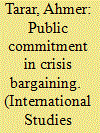

|
|
|
|
|
| Publication |
2009.
|
| Summary/Abstract |
The "audience cost" literature argues that highly-resolved leaders can use public threats to credibly signal their resolve in incomplete-information crisis bargaining, thereby overcoming informational asymmetries that lead to war. If democracies are better able to generate audience costs, then audience costs help explain the democratic peace. We use a game-theoretic model to show how public commitments can be used coercively as a source of bargaining leverage, even in a complete-information setting in which they have no signaling role. When both sides use public commitments for bargaining leverage, war becomes an equilibrium outcome. The results provide a rationale for secret negotiations as well as hypotheses about when leaders will claim that the disputed good is indivisible, recognized as a rationalist explanation for war. Claims of indivisibility may just be bargaining tactics to get the other side to make big concessions, and compromise is still possible in equilibrium.
|
|
|
|
|
|
|
|
|
|
|
|
|
|
|
|
| 7 |
ID:
091032
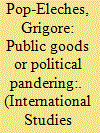

|
|
|
|
|
| Publication |
2009.
|
| Summary/Abstract |
This article uses empirical evidence from Latin American and East European International Monetary Fund (IMF) programs from 1982 to 2001 to analyze the nature and the extent of preferential lending practices by the IMF. Unlike prior work, which focused on narrow political interference from large IMF member states, the present analysis differentiates between such narrow interests and the Fund's international systemic responsibilities, which may justify the preferential treatment of systemically important countries to prevent broader regional or global crises. The empirical results suggest that systemically based deviations from technocratic impartiality predominate in situations-such as the Latin American debt crisis-where international financial stability is under serious threat. Under such circumstances, economically important countries do receive preferential IMF treatment but only when experiencing severe crises, while narrow "private goods" considerations are largely sidelined. When systemic threats are less immediate-such as in Latin America and Eastern Europe in the 1990s-IMF favoritism reflects a more volatile and region-specific mix of private and public considerations in line with the changing interests of powerful Western nations in the developing world.
|
|
|
|
|
|
|
|
|
|
|
|
|
|
|
|
| 8 |
ID:
091022
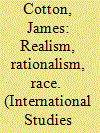

|
|
|
|
|
| Publication |
2009.
|
| Summary/Abstract |
The received view of the development of the international relations discipline in Australia discounts its early history, maintaining that it only came into existence in the 1960s. It was then confined, according to this account, within a realist-rationalist discourse. This article shows that if realism-rationalism is the identifying feature of the discipline in Australia, then many exemplars can be found in the earlier period from the 1920s to the Pacific War. Problems regarding empire, obligations towards the League of Nations, and Australia's position in the Pacific region were major concerns. Arguments in support of the League, or for an emerging Pacific order, were often couched in rationalist terms; with the increasing international uncertainty of the 1930s, realist arguments became more prominent. There are also some examples of revolutionist theory. However, a major preoccupation across the spectrum of international thinkers was the issue of race and the exclusionary White Australia immigration policy. It is argued that this theme cannot be readily assimilated to realism-rationalism.
|
|
|
|
|
|
|
|
|
|
|
|
|
|
|
|
| 9 |
ID:
091024


|
|
|
|
|
| Publication |
2009.
|
| Summary/Abstract |
In this article, I build a theory of European Union (EU) expansion using Social Identity Theory. The theory proposes that the development of a national identity in relation to Europe is the most significant contributing factor to a policy to support/oppose expanding the EU to include applicant countries. According to the theory, strength of identity-whether more national or European-is the key variable in explaining the policy toward applicant countries. As a preliminary exploration of the theory, I look at why some decision-makers within EU countries support Turkey's accession while others do not. The identities among top decision-makers within Britain, Germany, and France are used to examine the policy preferences regarding Turkey's bid for membership into the EU during these three recent progressions: the recognition of Turkey as a candidate country in 1999, the development of a timeline for full membership in 2002, and the beginning of accession negotiations in 2005.
|
|
|
|
|
|
|
|
|
|
|
|
|
|
|
|
| 10 |
ID:
091028
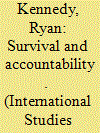

|
|
|
|
|
| Publication |
2009.
|
| Summary/Abstract |
This study re-examines the empirical support for one of the most influential explanations of leadership tenure, "selectorate theory," by testing for consistency across key regime categories. The argument made herein is that if the measures are good, the consistency of their relationships should not be limited to particular nominal regime categories, and they should capture the implications of the theory differentiating it from competing theories. Current measures of selectorate theory concepts are wanting on both fronts. I find that the measure used for winning coalition size is correlated with the destabilization of leaders in democracies and the stabilization of leaders in nondemocracies. I also find that the measure of selectorate size exhibits two behaviors inconsistent with the theory: larger selectorates are only stabilizing after the leader has already been in office for an extended period of time; and the effect is only substantial for differentiating between types of military regimes. These findings have five implications: (1) they cast serious doubt on the utility of current measures of selectorate theory; (2) they raise conceptual questions about the treatment of political regimes as vectors or categories; (3) they define substantive, not just statistical, issues that future measures will need to address; (4) they give baselines for re-analysis of the effect of these measures on other implications of interest; and (5) they provide an interesting comment on the comparative politics literature on hybrid regimes and the effect of parliamentary institutions in nondemocratic regimes.
|
|
|
|
|
|
|
|
|
|
|
|
|
|
|
|
| 11 |
ID:
091016


|
|
|
|
|
| Publication |
2009.
|
| Summary/Abstract |
What factors account for labor strategies in global industries? While some scholars point to economic factors and others look to political opportunity structures, an examination of union actions in the Central American apparel export industry over a 14-year period suggests that activists' historical experiences and ideological orientations also strongly influence union dynamics. Left-oriented unions tend to form unions through transnational activism whereas conservative unions most often turn to plant-level cross-class collaboration. Moreover, these two union strategies are interconnected. Successful transnational activism facilitates conservative union formation through a "radical flank" mechanism; the threat of left-union organizing motivates employers to accept unionization by conservative unions to block left unions from gaining influence in the plant. To examine these arguments, this article employs pooled time-series statistical analysis, structured interviews with labor organizers, and process tracing that draws on nine months of field research in Honduras and El Salvador.
|
|
|
|
|
|
|
|
|
|
|
|
|
|
|
|
| 12 |
ID:
091020
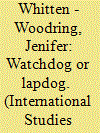

|
|
|
|
|
| Publication |
2009.
|
| Summary/Abstract |
A main justification for press freedom is that free media will act as a watchdog over the government. While we would expect democracies to have free media and autocracies to have government-controlled media, some democracies have government-controlled media, and some autocracies have free media. How this mismatch between regime type and media system influences government behavior is a puzzle worth exploring. One of the most widely criticized government behaviors is the violation of physical integrity rights. The question posed here is, how does media freedom affect government respect for these rights? In this article, I theorize that the relationship between media freedom and government respect for human rights differs, depending on the presence of democratic institutions. The findings support my premise. Specifically, the influence of media freedom on government respect for human rights is negative for the most autocratic regimes and positive for only the most democratic regimes.
|
|
|
|
|
|
|
|
|
|
|
|
|
|
|
|
| 13 |
ID:
091031
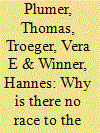

|
|
|
|
|
| Publication |
2009.
|
| Summary/Abstract |
This article explains the absence of a race to the bottom in capital taxation by analyzing fiscal competition under budget rigidities and tax equity constraints (fairness norms). We outline a political economic model of tax competition that treats the outcome of tax competition as one argument in the governments utility function, the others being public expenditure and tax equity. In accordance with previous theoretical research, tax competition tends to cause a reduction in taxes on mobile capital and an increase in the tax rates on relatively immobile labor in our model. Yet, our model predicts that governments do not fully abolish taxes on mobile capital. Instead, the government being least restricted by budget constraints and equity norms cuts tax rates to levels slightly below the lowest tax rates of those countries, in which governments are more constrained, where effective constraints are country size, budget rigidities and fairness norms. Analyzing data from 23 Organization for Economic Co-operation and Development countries between 1975 and 2004 we find empirical support for the hypotheses derived from our theoretical model.
|
|
|
|
|
|
|
|
|
|
|
|
|
|
|
|
|
|
|
|
|